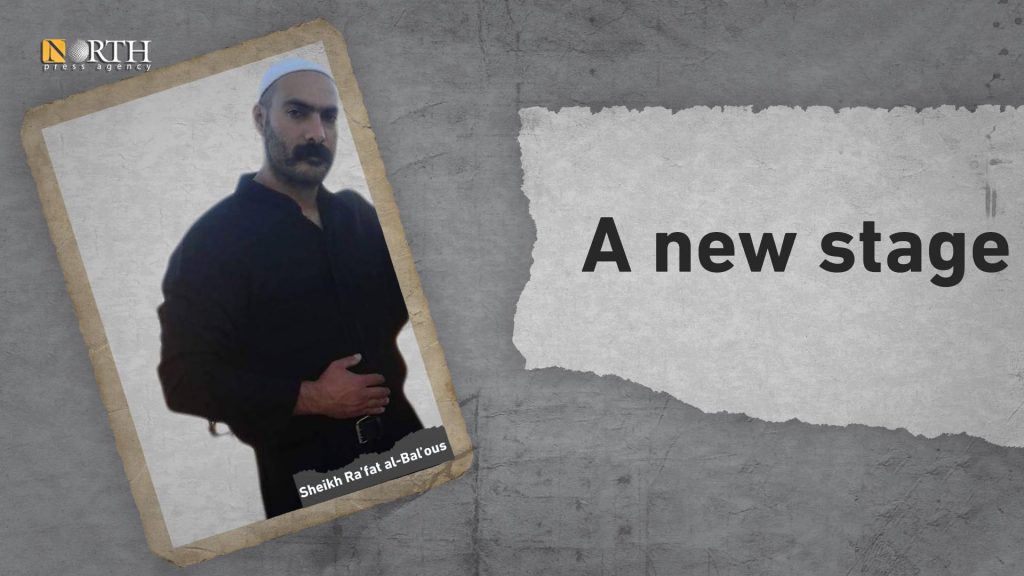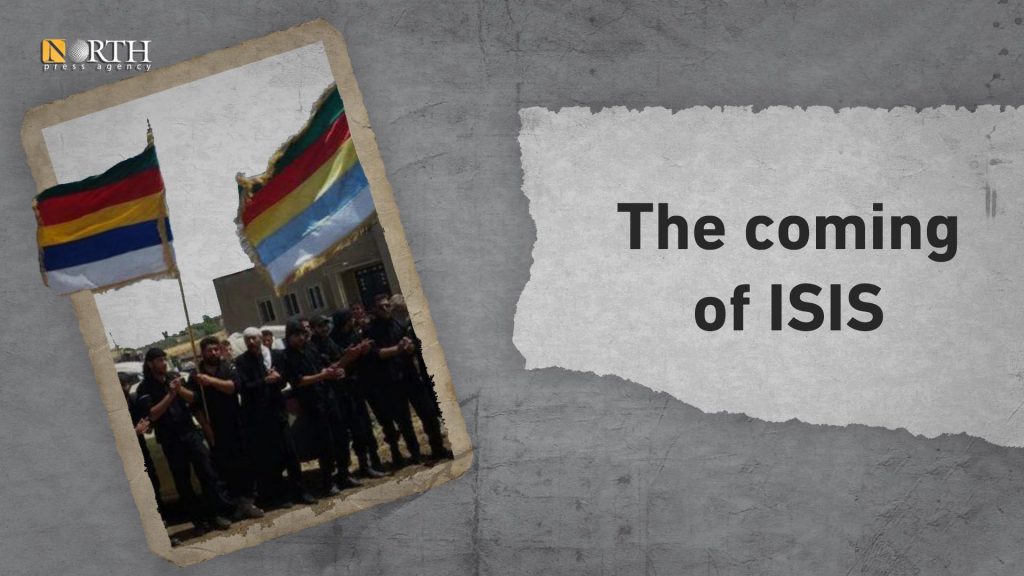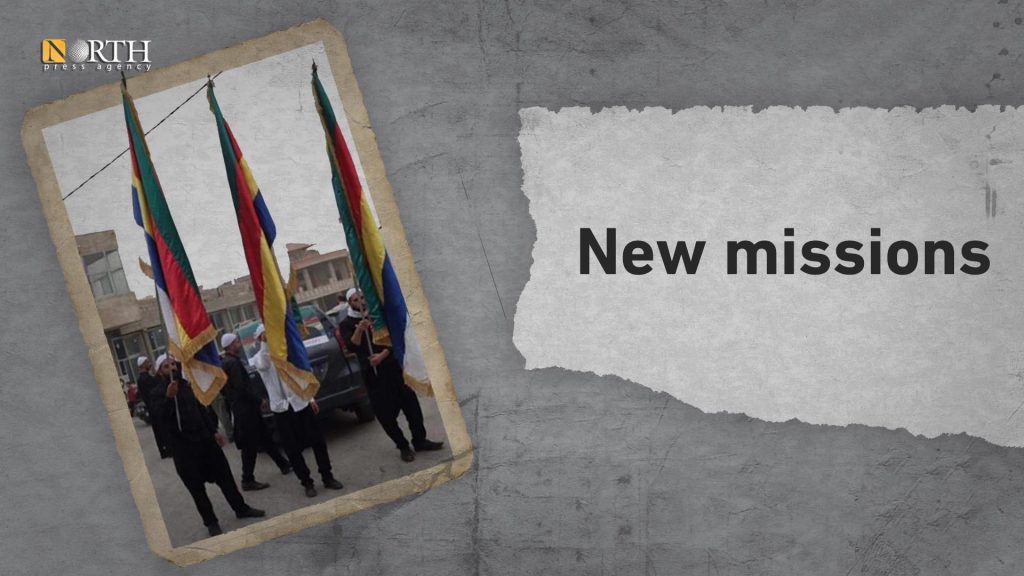This is part three of a series. Read part one here and part two here.
SUWAYDA, Syria (North Press) – The assassination of the founder of Men of Dignity movement, Sheikh Wahid al-Bal’ous, was a great shock for the movement, especially since a number of prominent leaders were killed in the operation that the regime was accused of planning.
The injury of Sheikh Ra’fat al-Bal’ous during the operation had a negative impact on the members of the movement, as his health condition prevented him from keeping pace with developments.
With the injury of Sheikh Ra’fat and his attempt to heal the movement’s wounds for about a year and a half, a change had to be made within the leadership of the movement, and Sheikh Yahya al-Hajjar was “qualified” to lead.
The choice fell on al-Hajjar because of his close relationship with Sheikh al-Bal’ous, and he was leading a “large group” in the southern countryside of Suwayda governorate.

On February 6, 2017, a statement was issued by the Leadership Council of Men of Dignity naming Sheikh Abu Hassan Yahya al-Hajjar as the movement’s leader in Suwayda.
Sheikh Abu Youssef Ra’fat al-Bal’ous called for an emergency meeting of the movement’s leadership council in the town of al-Mazra’a, as Sheikh al-Hajjar was appointed as the leader to replace Sheikh Ra’fat.
“Due to the sensitivity of his injury and the deterioration of his health, Sheikh Ra’fat al-Bal’ous ‘Sword of Dignity,’ requested the meeting of the council, where he made the decision to appoint Sheikh al-Hajjar to complete the task of leading the movement,” the statement said.
“Sheikh al-Bal’ous had a great impact in overcoming the calamities and difficult circumstances that the Men of Dignity experienced after the September bombing, and he encouraged and supported his men in facing all the pressures and obstacles,” the statement added.
“The reference for the leadership of the Men of Dignity will remain the headquarters of the martyr Sheikh Abu Fahd Wahid al-Bal’ous and ‘Sword of Dignity’ Abu Youssef Ra’fat al-Bal’ous,” it noted.
The task of al-Hajjar was not easy, as al-Bal’ous had a kind of charisma that al-Hajjar did not enjoy, and the phase in which al-Hajjar took over was different by all standards.
At that phase, the level of insecurity increased in Suwayda, which posed a great challenge to the movement, in addition to other challenges that were no less important.
The entry of the Russian forces into the Syrian territories has become a fait accompli, and the abuse of the Syrian intelligence services has changed from before through the use of their agents inside Suwayda to avoid direct confrontation.
Al-Hajjar started inviting all the groups of the movement with the aim of uniting the ranks, especially after many of them left after the departure of al-Bal’ous, and the resentment of others over the appointing of al-Hajjar as the leader of the movement.
In addition, some of the groups and their leaders went in a separate direction from the movement’s policy, as they “veered towards working in smuggling in search of financial resources for them.”
All this made al-Hajjar a great burden, and he was forced to follow a quiet and inclusive policy. He approached the Sheikh of Aql and began contact and coordination with it, and announced that they do not aim to target the “Syrian regime,” affirming that he was with the state and its institutions.
On the other hand, al-Hajjar announced that he would not accept the government’s raiding of houses to arrest dissenters or prosecution of those who failed to join compulsory military service. This led the regime to adopt a different approach with him as well.
The Syrian government agreed with al-Hajjar that they are ready to hear his demands when he wants regarding any event related to the governorate, without the need for the matter to develop into a confrontation or a show of strength.
In mid-2018, at a meeting in the governorate building that included a number of Sheikhs of Aql, notables and representatives of the government in addition to Russian envoys, the Russians labeled the Men of Dignity a “terrorist movement.”
This angered the clerics and notables, as they rejected the matter altogether, and said that there were no terrorists in Suwayda. “There are some outlaws who are criminals, but the Men of Dignity movement is a group of the sons of Suwayda who have armed themselves to defend the governorate against any external aggression and to control any security disorder that might happen inside.”
The response to the Russians made them reconsider their decision, which was made by the regime’s delusion and ambition, so that Russian envoys would come later and meet al-Hajjar to announce to him that they had retreated from their previous statements.
During the meeting, they offered to form a military force in Suwayda that includes the Men of Dignity, but their request was rejected, as al-Hajjar told them that he resides on Syrian territory, and this project is a deviation from the institutions of the Syrian state in which he lives.
Al-Hajjar also stressed that “the movement does not accept to be part of a force in the hands of anyone, and we have no goal but to maintain the security of Suwayda in the face of any external or internal aggression.”

On July 25, 2018, Suwayda witnessed a horrifying attack by ISIS on the villages of the region’s eastern countryside.
This coincided with several bombings carried out by some infiltrators in the city and the kidnapping of a number of women and children by ISIS in the villages of the eastern countryside.
The incident mandated an urgent alert for all local groups in Suwayda, in addition to everyone who had a weapon.
Among the groups that were mobilized and engaged in fighting to counter the surprise attack was the Men of Dignity.
Days after the ISIS attack, the Men of Dignity accused the regime of being behind the attack, and considered that the recovery of the kidnapped women would only take place with the hands of the sons of Suwayda.
After that, it took action, pursuing a number of people from the Bedouin tribes who were suspected of dealing with ISIS. It captured a number of them in order to pressure ISIS in exchange for the release of the kidnapped women.
However, it became clear later that although some of them had dealt with ISIS, the latter was not interested in their issue after their capture, while clans from Quneitra demanded their release and the families of the kidnapped people expressed their fear that the Bedouin families would exacerbate matters more than help resolve them.
All of this prompted the Men of Dignity to release the prisoners after announcing that it had received letters from the Russians declaring their interest in the issue of the kidnapped women, and that they would seek to take them back from ISIS.
In June 2019, young Muhannad Shihab al-Din was arrested at his private workplace by a group of young men from Suwayda who were found to be affiliated with the security forces.
No security agency claimed responsibility for the incident, but the arrest of Shihab al-Din came because of his verbal attack on those who visited President Bashar Assad from among the sons of Suwayda and broke a cup of coffee in front of him as a sign of their loyalty to him.
At the time, Shihab al-Din responded by breaking a cup of coffee in front of the entrance to the mausoleum of Sultan Pasha al-Atrash in the town of al-Qrayya, declaring that it was the only place where this symbolic significance deserves to take place. The matter annoyed the authorities, so they arrested him.
Days after the arrest, the Men of Dignity declared the security forces’ responsibility for that, and a group of the movement detained a number of security forces’ officers and members, demanding the release of Shihab al-Din in exchange for their return.
However, the intervention of several notables and mediators prompted the group to release the officers after they received a promise that Shihab al-Din’s release would happen, and he was truly released, but after four months.
In June 2020, following anti-government demonstrations in Suwayda calling for the fall of the regime and the departure of President Assad, security forces arrested 11 young people among the demonstrators, and the residents demanded the Men of Dignity intervene to release them.
However, a statement released by the movement came against expectations, in which it declared that it was “far from the political alignments and divisions which brought nothing but scourge,” and it said it was with freedom of expression, but not with the return of division and rift.
The statement added that the movement stands against arbitrary detention against those expressing an opinion or political thought, but it did not say that it would move to get the detainees out as some expected, calling for calm and everyone’s responsibility.
Days after the movement’s statement, the regime handed over three detainees to the Men of Dignity. The movement also received a promise to release the rest, and it appeared to be working for the detainees, but in ways that made it seem that it was not a priority for them.
However, the regime delay in fulfilling its promise prompted the movement to mobilize its members in the streets without doing anything more, by which it wanted to deliver a message to the regime, which released the remaining detainees the next day.

The Men of Dignity participated in the two battles of al-Qrayya in 2020 with the aim of “removing the Fifth Corps forces from the town of al-Qrayya,” according to the movement’s sources.
During the two battles, a number of the movement’s members were martyred and others wounded. The movement continues to present itself as a protector of Suwayda and its security against any external attack or internal encroachment, as it has repeatedly announced.
It says it also “seeks to preserve the people of Suwayda by protecting them from joining to the military service.”
As for the latest task that the movement took upon itself, it was to “stand against the recruitment of the sons of Suwayda to go to Libya via Russia.”
The movement says, through all its previous and current tasks and responsibilities, that it does not intervene except with regard to the security and safety of the governorate and the safety of its people from any harm that may befall them as a result of the ongoing war in the country.
However, for its part, the regime looks at the movement with suspicion, trying to reduce its popularity through rumors at times, or by trying to penetrate it or push it towards cases involving it in collateral losses, according to sources who spoke to North Press.
In spite of this, the regime does not hesitate to negotiate with it when the need arises, especially as it has imposed itself as an influential force in the governorate, and has become larger than a group of individuals that can be dealt with or “easily broke them.”
